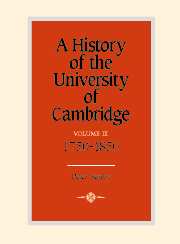Book contents
- Frontmatter
- Contents
- List of illustrations
- General Editor's preface
- Acknowledgements
- List of abbreviations
- Introduction
- 1 Townscape and university: topographical change
- 2 The university: its constitution, personnel, and tasks
- 3 Colleges: buildings, masters, and fellows
- 4 Colleges: tutors, bursars, and money
- 5 Mathematics, law, and medicine
- 6 Science and other studies
- 7 Religion in the university: its rituals and significance
- 8 The Orthodox and Latitudinarian traditions, 1700–1800
- 9 Cambridge religion 1780–1840: Evangelicalism
- 10 Cambridge religion: the mid-Victorian years
- 11 The university as a political institution, 1750–1815
- 12 The background to university reform, 1830–1850
- 13 Cambridge and reform, 1815–1870
- 14 The Graham Commission and its aftermath
- 15 The undergraduate experience, I: Philip Yorke and the Wordsworths
- 16 The undergraduate experience, II: Charles Astor Bristed and William Everett
- 17 The undergraduate experience, III: William Thomson
- 18 Games for gownsmen: walking, athletics, boating, and ball games
- 19 Leisure for town and gown: music, debating, and drama
- Appendices
- Bibliography
- Index
5 - Mathematics, law, and medicine
Published online by Cambridge University Press: 05 April 2012
- Frontmatter
- Contents
- List of illustrations
- General Editor's preface
- Acknowledgements
- List of abbreviations
- Introduction
- 1 Townscape and university: topographical change
- 2 The university: its constitution, personnel, and tasks
- 3 Colleges: buildings, masters, and fellows
- 4 Colleges: tutors, bursars, and money
- 5 Mathematics, law, and medicine
- 6 Science and other studies
- 7 Religion in the university: its rituals and significance
- 8 The Orthodox and Latitudinarian traditions, 1700–1800
- 9 Cambridge religion 1780–1840: Evangelicalism
- 10 Cambridge religion: the mid-Victorian years
- 11 The university as a political institution, 1750–1815
- 12 The background to university reform, 1830–1850
- 13 Cambridge and reform, 1815–1870
- 14 The Graham Commission and its aftermath
- 15 The undergraduate experience, I: Philip Yorke and the Wordsworths
- 16 The undergraduate experience, II: Charles Astor Bristed and William Everett
- 17 The undergraduate experience, III: William Thomson
- 18 Games for gownsmen: walking, athletics, boating, and ball games
- 19 Leisure for town and gown: music, debating, and drama
- Appendices
- Bibliography
- Index
Summary
THE ORIGINS OF THE MATHEMATICAL TRIPOS
ISAAC NEWTON AND NEWTONIANISM
When Isaac Newton, a yeoman's son, entered Trinity College in June 1661 he brought from his grammar school in Grantham proficiency in Latin (an excellent preparation for his correspondence with foreign savants), some Greek, and skill in constructing working models of windmills and other contrivances. At Trinity he was put through the arts course prescribed by the Elizabethan statutes of the university, in which Aristotelian logic and natural philosophy, inherited from the medieval curriculum, had a prominent place. Such was the fate of other undergraduates in seventeenth-century Cambridge (and Oxford), a fact that has led scholars like Christopher Hill to criticise the universities as sterile, and hostile to the new science of Copernicus and Galileo. Such comments underestimate the value of Aristotelianism, not merely as mental gymnastics but as a persuasive cosmology that even practitioners of the new science like Bacon and William Harvey still in large measure accepted.
Aristotelianism was in fact a flexible system that accommodated discoveries, and in retaining it the universities did not exclude scientific advance. Many dons were interested in the new science, and knowledge of it percolated down to students through the unofficial curriculum, mediated by tutors, that complemented the official one. One of Newton's notebooks reveals that he read the work of the new scientists, Kepler, Galileo, Gassendi, and Descartes; and we know that much of Newton's impetus came from a desire to counter what he saw as Descartes's faulty reasoning.
- Type
- Chapter
- Information
- A History of the University of Cambridge , pp. 147 - 202Publisher: Cambridge University PressPrint publication year: 1997



